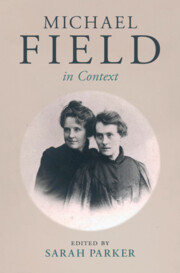Book contents
- Michael Field in Context
- Michael Field in Context
- Copyright page
- Contents
- Figures
- Contributors
- Preface
- Acknowledgements
- Note on the Text
- Chronology
- Part I Works and Days
- Part II Forms and Genres
- Chapter 7 Michael Field and Lyric
- Chapter 8 Michael Field and Verse Drama
- Chapter 9 Michael Field’s Short Prose
- Chapter 10 Ekphrasis in Sight and Song
- Chapter 11 Michael Field’s Love Lyrics
- Chapter 12 Sonnets
- Chapter 13 Devotional Poetry
- Chapter 14 Whym Chow: Flame of Love and Animal Poetry
- Part III In the Name of Time
- Part IV ‘Be contemporaneous’
- Part V Afterlives and Future Fields
- Further Reading
- Index
Chapter 12 - Sonnets
from Part II - Forms and Genres
Published online by Cambridge University Press: 03 October 2025
- Michael Field in Context
- Michael Field in Context
- Copyright page
- Contents
- Figures
- Contributors
- Preface
- Acknowledgements
- Note on the Text
- Chronology
- Part I Works and Days
- Part II Forms and Genres
- Chapter 7 Michael Field and Lyric
- Chapter 8 Michael Field and Verse Drama
- Chapter 9 Michael Field’s Short Prose
- Chapter 10 Ekphrasis in Sight and Song
- Chapter 11 Michael Field’s Love Lyrics
- Chapter 12 Sonnets
- Chapter 13 Devotional Poetry
- Chapter 14 Whym Chow: Flame of Love and Animal Poetry
- Part III In the Name of Time
- Part IV ‘Be contemporaneous’
- Part V Afterlives and Future Fields
- Further Reading
- Index
Summary
Katharine Bradley is responsible for the now well-known sonnets admired as the work of Michael Field. Many are collected in Wild Honey from Various Thyme (1908), a volume in preparation since at least 1893, though Bradley had been writing sonnets since 1869. This chapter details some of her earlier work, noting especially her use of the art sonnet and the memorial (or elegiac) sonnet. It examines her radical experiments with the sonnet form and her remarkable ability to translate ideas, impressions, and prose sources swiftly and deftly into fluent verse. A supreme later example of poetic translation is ‘Fifty Quatrains’ in Wild Honey, written for Charles Ricketts, her male muse, and the recipient, like Edith Cooper, of many fine later sonnets. Ivor Treby’s invaluable selections include noteworthy sonnets by Bradley unpublished in their day, though other examples very likely remain in the archives.
Information
- Type
- Chapter
- Information
- Michael Field in Context , pp. 105 - 113Publisher: Cambridge University PressPrint publication year: 2025
Accessibility standard: WCAG 2.0 A
Why this information is here
This section outlines the accessibility features of this content - including support for screen readers, full keyboard navigation and high-contrast display options. This may not be relevant for you.Accessibility Information
Content Navigation
Allows you to navigate directly to chapters, sections, or non‐text items through a linked table of contents, reducing the need for extensive scrolling.
Provides an interactive index, letting you go straight to where a term or subject appears in the text without manual searching.
Reading Order & Textual Equivalents
You will encounter all content (including footnotes, captions, etc.) in a clear, sequential flow, making it easier to follow with assistive tools like screen readers.
You get concise descriptions (for images, charts, or media clips), ensuring you do not miss crucial information when visual or audio elements are not accessible.
Structural and Technical Features
You gain clarity from ARIA (Accessible Rich Internet Applications) roles and attributes, as they help assistive technologies interpret how each part of the content functions.
